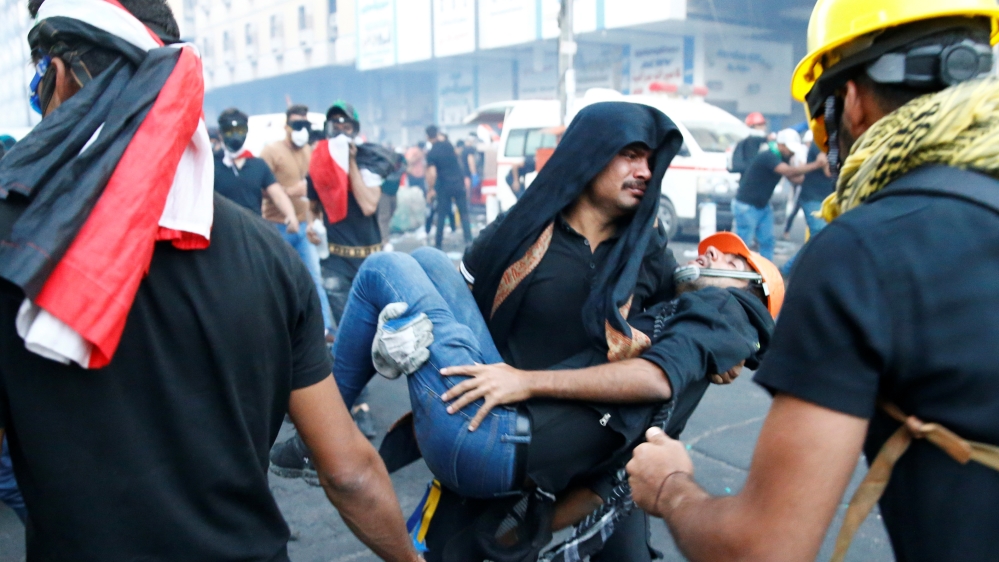At least two people were killed and 12 others were wounded after an improvised explosive device that was placed under a vehicle went off late on Friday, according to security sources and medics.
It was the first such incident in the capital since the demonstrations began in early October, although it was not immediately clear whether the explosion close to Tayaran Square and Tahrir Square targeted the protesters.
Separately on Friday, Iraqi security forces fired rounds of live bullets and tear gas towards demonstrators in central Baghdad, killing at least three people and wounding 25 others.
Protesters had repeatedly regrouped from under clouds of tear gas as they fought to tear down a concrete wall blocking access to Khilani Square.
Security forces erected the barrier to keep the demonstrations from crossing a bridge that leads to the fortified Green Zone, which houses government buildings and foreign embassies.
The clashes come as rights groups condemned the use of excessive force by police and security forces when dealing with peaceful demonstrators, as well as medical workers and ambulances.
Since October 1, Iraqis have been pouring onto the streets of Baghdad and southern cities to protest against corruption and the government’s failure to deliver basic services and economic opportunities.
The protesters’ demands have since widened to include the resignation of the government and a complete overhaul of the country’s political system, which was established after a US-led invasion that critics say has allowed certain individuals and groups to enrich themselves and expand their influence.
At least 320 people have died since October 1 with more than 15,000 wounded during the protests, according to the Iraqi Parliament’s human rights commission.
New electoral law
Hours before Friday’s clashes erupted, Iraq’s top Shia leader, Grand Ayatollah Ali al-Sistani, reiterated his support for the demonstrators in his weekly sermon, saying none of their demands have been met so far and that electoral reform should be a priority.
He called for a new election law that would restore public confidence in the system and give voters the opportunity to bring “new faces” to power.
Last week, al-Sistani said he backed a plan by the United Nations mission in Iraq aimed at meeting the demands of the protesters, but expressed concern that political parties were not serious about carrying out the proposed reforms.
On Friday, Iraqi authorities appeared determined to disperse the protesters and keep them confined to a shrinking space in the capital’s centre.
The confrontations in Khilani Square began on Friday afternoon after hundreds of demonstrators who breached the concrete barriers streamed into the square, where they were met by soldiers and riot police.
Read Also: Trump Open To Deal With Democrats Over Obama’s DACA Project
Several protesters said breaking through the barrier leading to Khilani was key to counter attempts by the security forces to suppress the anti-government movement and limit protesters to the nearby Tahrir Square.
“They are trying to limit us to one place,” said Nashat Akram, 24, recovering in a medical tent in Tahrir Square.
The atmosphere at Tahrir was a striking contrast with the violence nearby. Baghdad’s main square has been transformed into a carnival-like hub where protesters gather around music, comic art installations, pop-up food and street shops.
Al Jazeera’s Mohammed Jamjoom, reporting from Tahrir Square, said the site was the only place where it is “lawful for people to protest in Baghdad”.
“There’s a lot of contradiction here because while you have the violence going on in places like Kilani square, here there is e a festive atmosphere,” Jamjoom said.
“You also have ambulances and medics bringing people the injured from those other clashes here for treatment.”
Tuk-tuk drivers ferried the wounded back to makeshift medical tents stocked with saline used to douse demonstrators exposed to the tear gas. Many retched on the floor when they got there, saying the gas was the strongest they had ever experienced.
Previous pledges
Iraq’s embattled Prime Minister Adel Abdul Mahdi has promised that his government and judiciary would continue to investigate deaths and promised to release detainees.
The 77-year-old has also promised more job opportunities for graduates and pledged to punish a handful of corrupt officials – but the pledges have done little to quell the protests.
Abdul Mahdi came to power last year through a shaky alliance between populist Shia leader Muqtada al-Sadr and Hadi al-Amiri, a leader of the Hashed al-Shaabi, or Popular Mobilisation Forces, paramilitary network.
He has refused to step down, but has said he is willing to resign if political leaders agree on a replacement, according to President Barham Salih.
The unrest is among the largest and most complex challenges to the current ruling elite since it took power after the United States invasion and the toppling of Saddam Hussein in 2003.
SOURCE: AL JAZEERA AND NEWS AGENCIES


